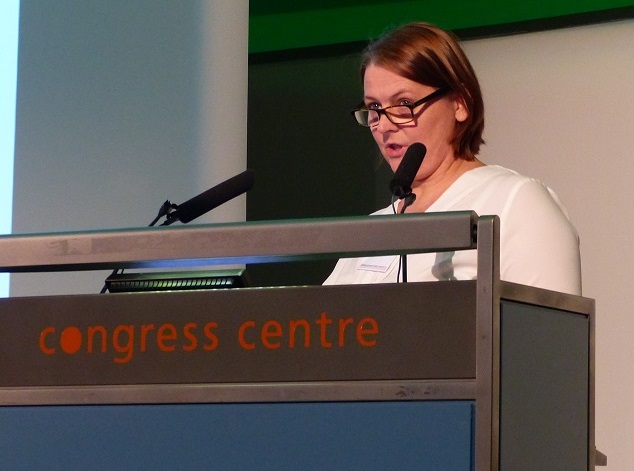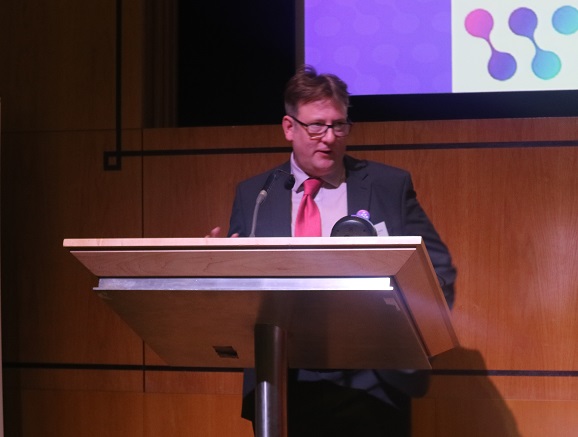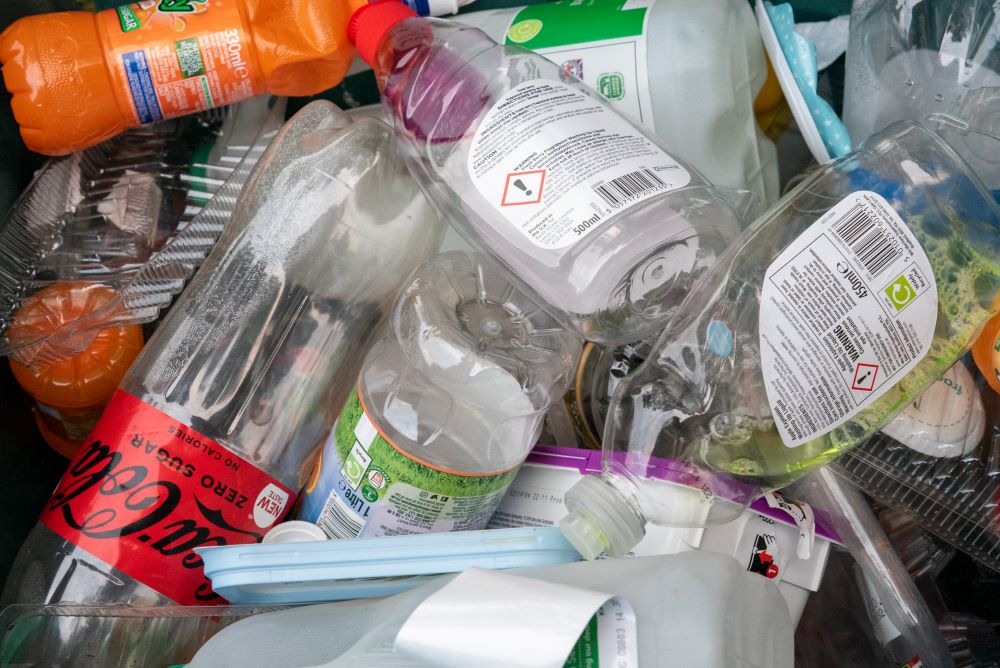The announcement was first made at 09:00 on 25 July and then first published by letsreycle.com, before the original announcement was pulled. It was later re-published.
With views in from across the waste supply chain, producer groups have welcomed the delay, while local authority groups have been highly critical. Defra reasoned that the decision was made as part of efforts to drive down inflation (see letsrecycle.com story).
You can see all the responses below, which were included in a live reaction blog, which has now closed.
A dedicated Packaging & EPR Theatre sponsored by Valpak at this year’s RWM Expo is taking place online on 13/14 September 2023. This full day event full of content will explore responses to the consultations and aims to bring the industry together for networking and discussions on the proposals. Visit HERE for details.
Beyondly says delay gives government ‘great opportunity’
Emma Wilkinson, regulatory affairs leader at the compliance scheme and consultancy, Beyondly, has said the delay will provide government with a “great opportunity” to carry out strong stakeholder engagement.

She explained: “At Beyondly, our team is working hard to support producers navigate through the complexities of the new regulations and data reporting requirements. We welcome this delay to fees as an opportunity to further share our experiences with government and help shape the system for the benefit of producers.
“This delay also provides producers and industry with the much-needed opportunity to budget and prepare for the EPR waste management fees that will now be introduced in 2025. We want a system that is robust, efficient, and successful at increasing recycling rates, accelerating us towards a circular economy, that will ultimately drive us towards decarbonisation. So, we encourage all stakeholders to seize this opportunity to ensure the best chance of success at implementing EPR for packaging, and Beyondly is here ready to support this collective effort.”
Paper Industry body welcomes ‘frustrating delay’
Dimitra Rappou, executive director at the Confederation for Paper Industries, explained that while the move is frustrating, she feels it was needed.
The director of the CPI, a trade association representing the UK’s Paper-based Industries, said “there is still much work to be done” for the UK’s EPR system to be fully developed.

Ms Rappou said: “All sectors have been facing increasing pressures due to the lack of progress on the Collection and Packaging Reforms, but timescales for EPR have been rightly extended to provide more preparation time. Although we await a more comprehensive announcement regarding the future of these reforms, it remains disappointing that, even after over two years since the consultation closed, there is no further clarity on the Consistency of Collections consultation.
“Given the circumstances, it is crucial for the Government to seize this opportunity presented by the delay and create a robust support mechanism to enhance the quality and quantity of recycling entering the waste stream. We urge the Government to show leadership and prioritise the introduction of a standardised collection system ensuring separate collections for paper and card, thereby reducing waste and lowering carbon emissions by promoting longer usage of materials.”
‘Legacy of dysfunctional government’
In a strongly worded statement, Matthew Homer, the waste strategy manager at Islington council, was critical of the government over the delays.
He said: “This is surely a legacy of a long period of dysfunctional government during which practically nothing happened. Lately there’s been a flurry of preparation and excellent engagement, but it’s obviously too little too late.
“Government really needs to make it crystal clear that it remains committed to these reforms and that this isn’t part of a wider back tracking on net zero policies. Local Authorities also need urgent clarification about consistency proposals, particularly the promise of new burdens funding to cover the cost of food waste collections.”
Welsh government: ‘EPR delay is a ‘joint decision’
The Welsh government has published a detailed statement from Julie James, the minister for climate change, detailing that the decision to delay EPR payments was a “joint decision”.
The minister said that the decision was taken on the back of feedback from both businesses and local authorities, “who requested additional time to both engage with and prepare for the forms”.

In the statement, she said: “The revised timeline for packaging EPR will enable us to work with business, local authorities and wider stakeholders to further refine the scheme to ensure it will effectively deliver our shared environmental goals and help to place the sector on a clear pathway to decarbonisation.”
She also provided four benefits of delaying the scheme, including giving industry more time to prepare and allowing local authorities to “make provisions for new obligations and adjust current services ready for the introduction of the reforms”.
The minister also said the delay will “de-risk the scheme’s delivery as the current delivery timelines are jeopardising its feasibility and long-term value for money.”
WRAP says EPR delays ‘deeply frustrating’

Claire Shrewsbury, director of innovation and change at WRAP explained that while the body appreciates “the complexities of introducing these changes, the announcement of a delay to the EPR packaging reforms is deeply frustrating”.
Ms Shrewsbury said: “The further worry is that this delay will then cascade down to implementing other policy reforms such as consistent collections of recycling and the ability for that to help tackle food waste. We know that food waste is costing households £730 a year and mandatory food waste collections can help reduce food waste in the home so we would urge that Defra moves ahead with them.
“Also leading companies are playing their part in meeting voluntary targets on plastics, but to achieve some of the targets set needs a clear national strategy including EPR and country-wide consistent collections across local authorities. WRAP will continue to play its part to ensure that this delay truly enables the best outcome for these reforms and delivers the greatest impact.”
Retail group welcomes EPR delay
The British Retail Consortium (BRC), which represents some of the largest producers in the UK including Amazon, Tesco and Sainsbury’s, has backed the decision to delay payments.
The BRC has been vocal in recent months in its efforts to have the system pushed back, repeatedly urging Defra to go back to the drawing board.

Andrew Opie, director of food and sustainability at the British Retail Consortium, said: “The Government is right to extend the timelines on its packaging reform. Its plans are not ready, and this would simply drive up food prices without delivering the improvements in recycling everybody wants. We need to use the additional time to design an effective recycling scheme that delivers value for money for households across the UK.
“Recycling rates have stagnated for a decade. If they are to rise, there must be better coordination of the Government’s waste reforms so that there is consistency in how we recycle across the country. It’s also vital that the £2bn EPR is expected to raise annually, is targeted towards improving infrastructure to boost the supply of recycled material for reuse. We look forward to continuing to work with Government to ensure that EPR delivers for the environment and for consumers.”
‘Sad and frustrating’, Staniforth says
Ecosurety’s innovation and policy director Robbie Staniforth said he delay is “sensible but tinged with sadness for what could have been”.
He explained: “It comes as no shock that the timelines for waste management payments have been delayed. While civil servants have been working hard to meet the challenging timescales, there simply hasn’t been enough political will or strong leadership at pace from the senior politicians above.
“It is a shame that five years after declaring an intention to introduce ‘full net costs’, under an Extended Producer Responsibility system, that the Government are still not ready. All the major stakeholder groups have devoted countless hours to help government understand what is required, but unfortunately, the topic of packaging, and its reuse and recycling, didn’t prove to be a significant enough priority to the department or wider Government.”
He also gave more insight in the below video on Linkedin.
NLWA accuses government of ‘penalising taxpayers’
The chair of the North London Waste Authority, Cllr Clyde Loakes, has said the delay to EPR payments will hit taxpayers.
In a statement on the NLWA website, he said: “For more than four years now we’ve been calling for an extended producer responsibility system that gives money to councils and communities to fund waste prevention projects and more extensive recycling collections.

“It seems that for four years the government has been listening to manufacturers who want to profit at the expense of the environment with unsustainable packaging and disposable products. Lobbyists are using the cost-of-living crisis as a smokescreen, saying that manufacturers can’t afford to be liable for disposal costs, but in their eyes its fine for the burden to fall on council tax payers.”
Suez ‘disappointed’ with delay
Dr Adam Read, chief external affairs and sustainability officer for Suez Recycling & Recovery UK, said that although the delay was expected, Suez is still “disappointed”.

He said: “Years of inaction are creating real challenges for our sector – inhibiting us from taking the next step to invest in vital services and infrastructure. We have now reached a point where the continued lack of clarity over timelines for these reforms is taking a toll. We urgently need to push ahead, as any further delays will have a significant impact on our efforts to tackle climate change and make the UK’s 2050 Net Zero targets harder to deliver.
“We welcome the proposed transition of the rollout of the legislation and urge government to now move at pace with implementing consistent collections so we can deliver on EPR reforms effectively, while ensuring alignment with broader government Net Zero policy. Default DEFRA policies and DESNZ policies need to be aligned on timescale, especially the UK Emissions Trading Scheme (UK ETS), to allow us to accelerate our efforts in the decarbonisation of our operations.
“We look forward to getting EPR and this consistency over the line once all the detail is confirmed so that we can finally begin to deliver the changes needed for the future health of the planet.”
‘Use delay to prepare,’ Valpak urges businesses
Steve Gough, chief executive at the UK’s largest compliance scheme, Reconomy brand Valpak, said the delay actually provides a “great opportunity to have a dry run” of the EPR data collection process.

He said: “In the current economic climate, stakeholders face tough choices. With consumers under significant pressure from the cost-of-living crisis, both government and business are struggling to balance budgets against a commitment to progress with environmental improvements.
Defra said that EPR charges would be delayed until 2025, with charges under the current PRN regulations to carry on into 2024.
“This offers a great opportunity to effectively have a dry run of the EPR data collection process, so that targets for 2025 EPR can be set in the most appropriate manner.
“EPR calls for data to be collected and prepared in a new format, and those which have not prepared will struggle to meet deadlines at short notice. Valpak staff are on hand to support members with any questions and issues they have with collecting data. This extended data collection requirement and the delay in the EPR charges gives opportunities for businesses to analyse and make changes ahead of the increased costs coming in 2025.
“Companies in a number of sectors have been facing uncertainty over whether they need to register, particularly converters of packaging, franchisees and those in hospitality. But under the new delay they will remain obligated under the previous system until the end of 2024.”
EPR delay ‘throws doubt’ over wider reforms
The National Association of Waste Disposal Officers (NAWDO) has said the delay to EPR “throws further doubt on how and if wider reforms will be taken forward.”
A statement on behalf of the association explained that EPR is a “vital component” of the wider reforms of the waste and resources sector that were set out in the Resources and Waste Strategy, and the delay casts doubt over this.

The spokesperson explained: “This is particularly true for the Consistency agenda, on which there has been no government response to the second consultation that closed more than two years ago.
“Local authorities face increasing financial pressures from the disjointed approach that has been taken to policy delivery from different government departments and need to see this approach changed.”
NAWDO chair, Sam Horne, stated: “Local authorities stand ready to implement the Collections and Packaging Reforms but can only do so with the right legislative and financial levers in place.
“We are keen to work with Defra to ensure that implementation is done as quickly as is practicably possible and ensure the right environmental and social outcomes are achieved.”
OPRL calls for clarity and engagement before revised EPR deadline
The On Pack Recycling Label (OPRL) has called on the government to “make use” of the time to deliver greater clarity and build on stakeholder engagement.

Margaret Bates, managing director at OPRL and former president of CIWM, said: “While we are keen to see the implementation of EPR, this delay has the potential to offer producers and local authorities valuable time to budget and prepare. However, with such a radical overhaul of costs and systems, it is crucial that guidance is provided well in advance of the next deadline.
“Robust stakeholder engagement will also help to ensure successful implementation. While local authorities now know that consistency implementation will remain on course, they are still are waiting for clarity. Many brands are also keen for information on consistency to enable them to assess packaging materials and make relevant changes. This is a big change for every area of the supply chain, so the more support available from Defra, the better.”
LGA says delay will lead to ‘crucial loss of momentum’
The Local Government Association (LGA) has joined other local authority groups in saying that the decision to delay the scheme is “disappointing”.
Cllr Darren Rodwell, environment spokesperson for the association, explained that the move will mean councils lose “crucial momentum on ambitions to clean up our environment, while council taxpayers continue to pay for dealing with unnecessary and unrecyclable waste.”

He added: “Good packaging can be important for keeping products fresh and intact. But everybody can see the unnecessary waste, across our shop shelves, delivered to our homes, and into our bins. For instance the UK gets through six billion bags of crisps a year, but there is usually more packet than crisps, they are nearly impossible to recycle, and that is just one item.
“The delay means there will be another year of excessive packaging impacting our environment and climate change, and further uncertainties and delays causing councils real difficulties in managing their long-term waste contracts.
“It is crucial now that government, industry and councils all put the foot to the floor in planning full implementation from 2025, and that Government extend EPR to cover other material types beyond just packaging.”
Cost of living ‘excuse is misplaced’
William Maxwell, co-chair of CAGS (Community Action Groups) Oxfordshire, has said that any move to delay the EPR scheme on the grounds of cost of living concerns are “misplaced”.

He said the delay will now see the “financial burden of managing packaging continuing to fall to local government and therefore to tax payers”.
Mr Maxwell explained: “The result? Those that can afford to purchase large amounts of packaged items will continue to pay the same as someone struggling to buy essentials. The idea, therefore, that this helps those struggling with the cost of living crisis, is wrong.
“It appears that the continued inability of government to take decisions, especially ones businesses effectively lobby against, is what is behind this delay.
“Local Community Action Groups in Oxfordshire and across the UK know too well that reducing packaging will improve both the local environment and the planet. They will continue to look on with dismay as levers to force long-overdue packaging re-design that will drive down waste and reduce carbon are being ducked.”
Ecoveritas says delay is ‘bittersweet’
The head of sustainability & consulting at data specialist Ecoveritas, Kathy Illingworth, has described the delay as “bittersweet”.

She said while it should allow Defra to build in more clarity, “there is certainly a job to be done to rebuild confidence”.
She added: “All eyes will be on the industry now, who, having gotten the delay they wanted, should rally around a good policy for the planet and the environment. Perhaps the government can now make progress on the consistency of collection by local authorities, which will be essential if EPR is to be the effective policy we know it can be.
“What is clear is that there were major question marks over the scheme’s readiness and a real lack of confidence. We must now prioritise agreeing and setting the fees this summer so that affected companies can plan for these additional costs.
“Despite the further delay and the risk that the scheme’s implementation is lost in the run-up to the election, Ecoveritas stands ready to work with government and industry to design an EPR scheme that delivers a high level of recycling and effectively tackles packaging waste.”
APSE bemoans ‘lingering uncertainty’
The Association for Public Service Excellence (APSE) has said the move does have benefits, but will impact on budget planning.
A spokesperson explained: “Whilst it is better to delay and resolve any issues which may cause serious problems in the long-term, this lingering uncertainty continues to have an adverse impact on the planning of budgets and future service delivery.
“We need certainty of funding and policy to ensure waste and resources strategies are implemented effectively. As demonstrated with the DRS in Scotland, local councils are integral to the success of any changes and have to be involved at the top level of decision making from the very start.”
LARAC says producers granted a ‘stay of execution’
Cathy Cooke, chair of the Local Recycling Advisory Committee (LARAC), has hit out at the decision to delay EPR payments, saying this means councils have to continue to “foot the bill” for the managing of packaging waste.

She said LARAC and its members are “extremely disappointed and frustrated” by this morning’s announcement, consequently meaning they “will have to continue to foot the bill for the management of packaging waste, whilst the producers of said packaging have once again been provided a ‘stay of execution’ by the government.”
Ms Cooke added that local authorities are under “more and more pressure to fund services within a very challenging environment”, and also said that Defra does not “appear to appreciate the severity of the situation”.
She added: “Four and a half years on from the release of the Resources and Waste Strategy, there is still nothing concrete from government for Local Authorities to work towards. With continued delays in the major reforms, Local Authorities have been unable to plan accordingly for these changes, which will have a significant impact on their time and resources, something which doesn’t seem to be fully appreciated by Defra”.
Ms Cooke concluded that local authorities have provided “excellent recycling and waste services for many years, and they are well-placed to adapt to any changes required by the reforms and have welcomed the commitment to EPR”. She sadded that the cost-of-living crisis is “being used as the justification for delaying EPR, ironic when the public will be the ones who pay for the services provided by Local Authorities in the interim. This delay will inevitably lead to confidence losses in investment for the required infrastructure needed to improve the quantity and quality of packaging that is recycled in the UK.”
Recycling Association chief slams delay as ‘unbelievable’

The chief executive of the Recycling Association, Paul Sanderson, has been more critical of the delay than some others.
He described the decision to push it back as “unbelievable, saying: “We’ve been waiting too long for EPR and Consistency of Collections to be introduced, and we need to get on with it.
“Both of these policies have the potential to transform the UK recycling landscape, and provide essential funds to develop UK infrastructure. We’ve had too many years of drift already since these policies were first announced in 2018, and now it seems we won’t get any further until at least 2025. That is too long, especially as much of the detail should have long been worked out.
“This delay must ensure that we are fully ready to implement EPR and Consistency of Collections soon after with all of the policy detail worked out and agreed.”
Clarity praises Defra for ‘listening to industry feedback’

Martin Trigg-Knight, director of compliance services at Clarity Environmental, said while the delay was “inevitable”, it is “encouraging” that Defra has taken the move to delay EPR.
The former chair of the Packaging Scheme Forum said: “We are pleased to note the confirmed delay to the EPR payment structure. Anticipating this delay as inevitable, we find it encouraging that Defra has listened to industry feedback and responded with a pragmatic revision of the payments timetable to facilitate a workable staggered start to EPR.
“This allows Defra to address data reporting format issues without imposing significant financial consequences on producers. We welcome further details as they are released.”
Food and Drink Federation says EPR delay is ‘welcome news’
The chief executive of the Food and Drink Federation (FDF), Karen Betts, has said today’s announcement of a delay to is welcome news.

The FDF said at the National letsrecycle.com Conference in June that the scheme is facing “significant hurdles” (see letsrecycle.com story).
In a statement earlier, she said: “It’s a bold decision to go back to the drawing board and reappraise the scheme and the corresponding waste reforms but it’s the right one, especially in the current economic climate with inflation at record levels.
“But the hard work starts now. It’s critical that government works rapidly with industry and others to ensure we create a consistent, efficient, nationwide scheme that drives up recycling rates across the UK and enables more recycled material to be used for new packaging.
“Food and drink manufacturers want EPR – we need it if we are to meet our stretching environmental targets. We stand ready to work closely with government, learning from schemes already in operation around the world to design a policy that works for consumers, industry and the environment.”
Delay will be a ‘huge relief’
Phil Conran, the former chair of the Advisory Committee on Packaging and a waste consultant with 360 Environmental, has said Defra’s EPR delay will come as a “huge relief” to some, but will not be a surprise.
Rumours of a delay have been growing in recent weeks, with the government also ranking the delivery of packaging reforms, which includes EPR, consistency and the deposit return scheme as “unachievable” by 2027 (see letsrecycle.com story).

In a statement given to letsrecycle.com, he said: “It has seemed inevitable for some time given the potential impact on living costs.
“It will be a huge relief to businesses caught under the ridiculous definition of household waste and will also give more time to ensure that the waste costs are properly shared across all large producers when they are finally applied.”
Wastepack says EPR delay ‘makes sense’
Paul Van Danzig, policy director of the compliance scheme Wastepack, said: “I think the delay makes sense. Nobody is going to be out of pocket through the move as collections will continue to be funded as they were before, rather that obligated producers.”

Mr Van Danzig explained that the key to getting EPR right is consistency, which gives every UK household a core set of materials which will be collected.
He added: “In summary, the decision to delay the scheme doesn’t change much in the short-term.”
ESA finds delay ‘incredible’
The Executive director at the ESA, Jacob Hayler, published a statement saying it is “incredible” that Defra has announced a delay after “two rounds of formal consultation and countless man-hours spent in preparation.”

He said: “Critical waste reforms continue to be hamstrung by dither and delay – with full Extended Producer Responsibility (EPR) payments now seemingly on the cusp of being pushed back; the Public Accounts Committee launching an inquiry; and the recent publication of a critical National Audit Office (NAO) report urging Defra to establish ‘firmer foundations’ for its work on resources and waste, and to improve its programme management. Added to that, the Government’s Infrastructure and Projects Authority recently gave Defra’s Resources and Waste Strategy reforms a “red” status confirming that programme delivery within anticipated timescales now looks unachievable.”
He added that recycling rates have stagnated in the UK for a decade and other recently announced longer-term measures – like banning organic waste from landfill and taxing energy recovery – “must be balanced by recycling reforms that incentivise the removal of wasteful packaging from sale; support viable markets for secondary plastics and which provide consumers with a consistent, clear and easy-to-use set of recycling services across the nation”.
Mr Hayler concluded: “As the NAO notes in its report, the lack of clarity has made it difficult for organisations to plan and invest the billions required for infrastructure and services to raise recycling rates and reduce waste. Continued political malaise over the reforms simply delays the UK’s inevitable and vital transition to a more sustainable and resource-efficient economy – placing us well behind other nations – and puts at risk billions of investment in new green infrastructure and jobs.”
CIWM ‘disappointed’ with EPR delay
Lee Marshall, policy and external sffairs director at the Chartered Institution of Wastes Management (CIWM), said he the institution is disappointed with the delay, after raising concerns directly with the PM.

He said: “While this is not altogether surprising, we believe this delay will have a significant impact, resulting in the public continuing to bear the cost of packaging recycling and disposal, less investment in recycling infrastructure due to a loss of confidence in the legislative framework, and a significant slowing of the UK’s green economy.
“Today, we reiterate our call for government to press ahead with executing the reforms on EPR and consistent collections. The sector is ready, willing and able to implement them and bring about the step-change in recycling rates that they are designed to deliver. This is a valuable opportunity for the UK to show strong leadership and demonstrate its commitment to lead on combatting climate change, and CIWM stands ready to support as we continue our journey to a world beyond waste.”











Subscribe for free